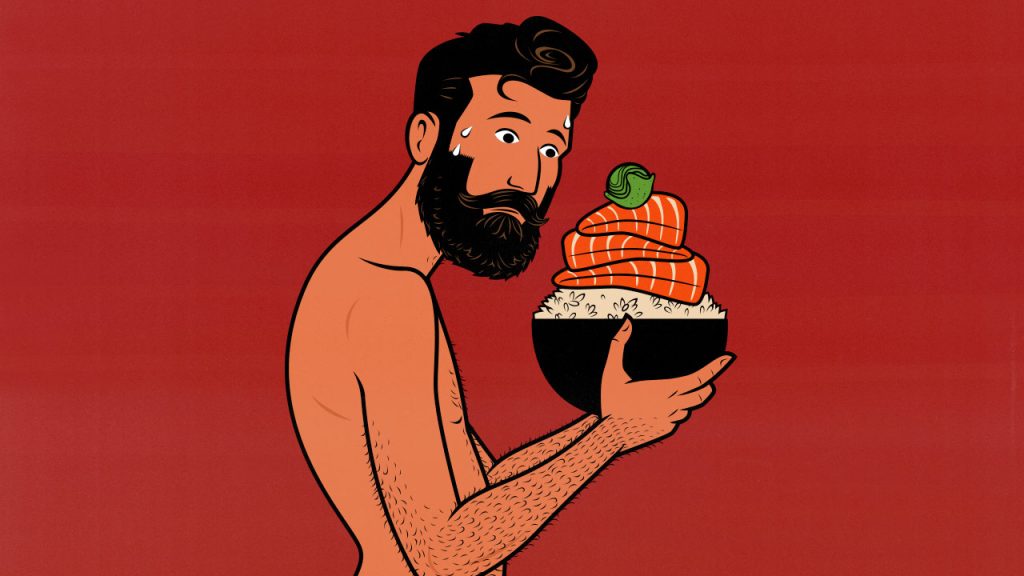
How Many Calories Does It Take To Build a Pound of Muscle?
In theory, it takes about 800 calories to build a pound of muscle (study). That’s true in some situations, but our metabolisms can adapt, increasing the amount of energy it takes to build muscle—sometimes by quite a lot.
Let’s say you’re a skinny guy who’s new to lifting weights, and you want to gain about a pound of muscle per week. If it only took 800 calories to build a pound of muscle, you’d only need to eat around 100 extra calories per day. But your metabolism can easily adapt to burn an extra couple of hundred calories, so your weight might not change. In practice, you might need to eat closer to 400–500 extra calories to gain a pound per week.
At the same time, you don’t want to eat too much. A mason can only lay so many stones in a day. Giving him more energy than he can use won’t help him lay those stones any faster. Instead, the extra calories will simply be stored as body fat.
So, let’s talk about how many extra calories you should eat to build muscle.
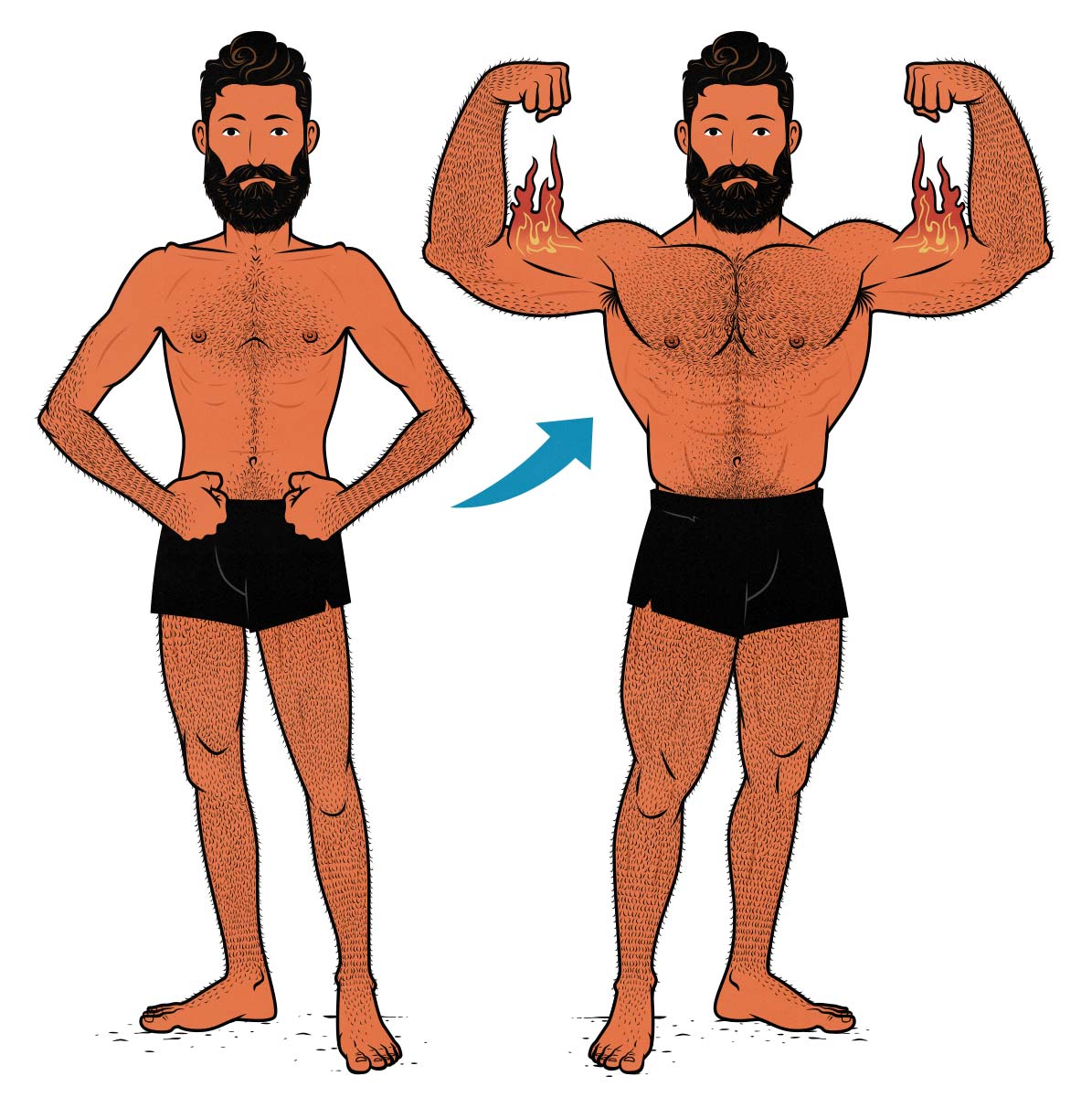
Estimating the Energy Cost of Building Muscle
Muscle is made of water (75%), protein (20%), and a mix of fat and glycogen (5%). Water weighs a lot, but it doesn’t contain any calories. Only the protein, fat, and glycogen can be broken down into energy. That’s why a pound of muscle only contains 800 calories, whereas a pound of fat contains 3,500 calories.
This is where people often make a mistake. They assume that since a pound of muscle contains 800 calories, you only need to eat 800 extra calories to gain a pound of muscle. That’s not quite right. If you’re stimulating muscle growth by lifting weights, you’ll burn around 300 calories for every hour you spend lifting. Then you need to digest all the extra food, burning up even more calories. Once you’ve digested that food, some of the energy is used to fuel muscle-protein synthesis (study, study, study).
Once you’ve built that pound of muscle, you also need to maintain it and carry it around. This burns another 12 or so calories per day. As you get deeper into a bulk, those extra pounds of muscle add up. By the time you’ve gained 20 pounds, that’s another 240 calories you’re burning every day.
Overall, it usually takes closer to 2,500 calories to gain a pound of muscle. That means you’d eat 400 extra calories per day to gain about a pound per week. If you want to err on the side of building muscle more leanly, maybe you eat 200 extra calories per day.
The real trick, though, is to weigh yourself every week and adjust your calorie intake accordingly. If you add 400 calories to your diet but don’t gain weight, add another 200 calories. Keep weighing yourself and keep adjusting.
Hardgainers & the Role of Genetics
Different people have different metabolic rates. Much of this is explained by how much you weigh and how much you move, but genetics also plays into it (study, study, study, study). There are outliers on either side. That’s why some people can build a pound of muscle with as few as 1,500 calories, whereas others need closer to 2,500 calories.
I wrote a full article about hardgainers on Bony to Beastly. We have another article about variations in metabolism. Some people skinny people really do have much faster metabolisms.
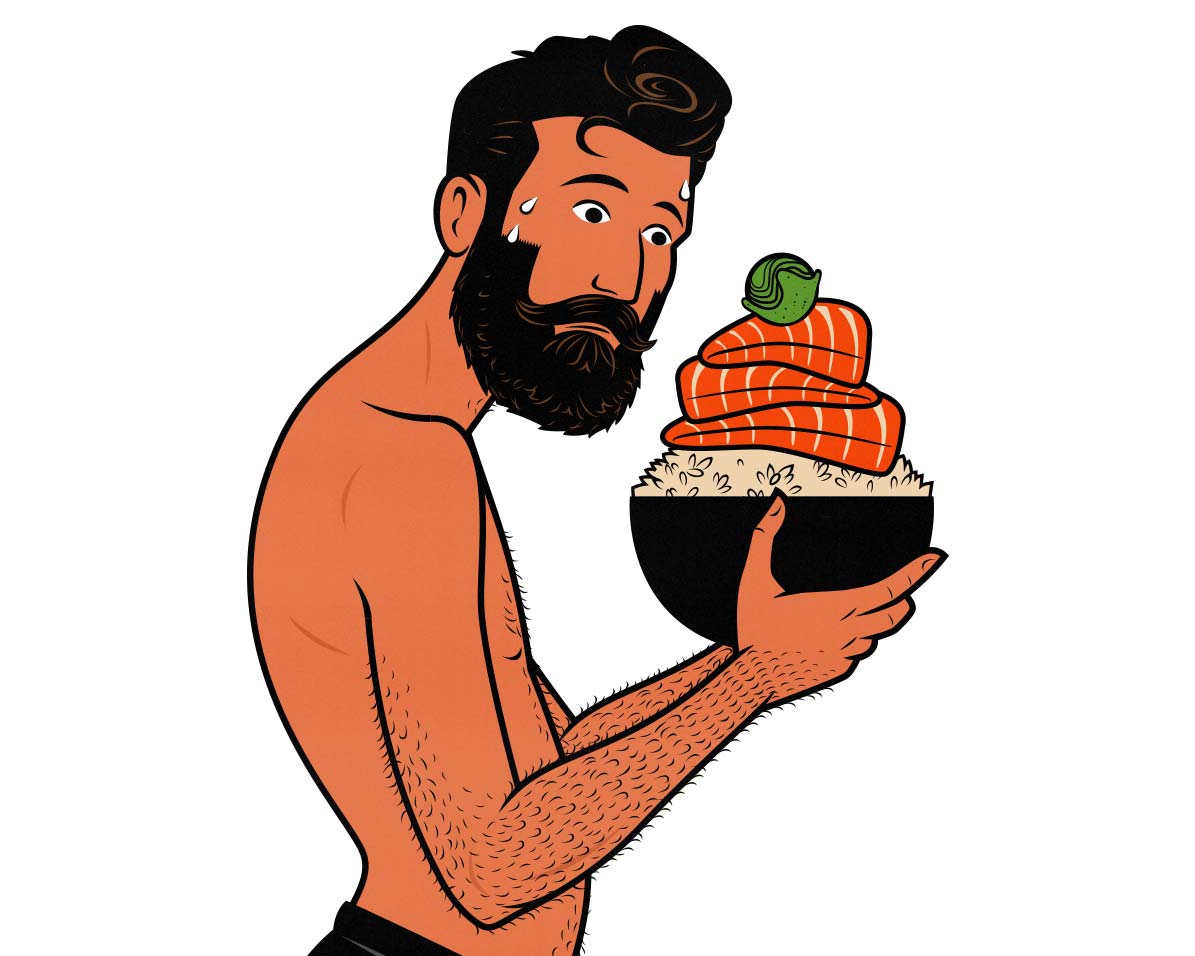
How Many Extra Calories Should You Eat?
Now we get to the important part: how many extra calories should you eat to maximize your rate of muscle growth? There are a few different paths you could take:
- If you want body recomposition, building muscle while losing fat, you don’t need a calorie surplus. You can build muscle by getting energy from the fat you burn. This works best for overweight and skinny-fat people.
- If you want to do a classic bulk, building muscle quickly and leanly, start with a calorie surplus of around 400–500 calories per day. That will have you gaining around a pound per week. This works well for the average person trying to build muscle (article, study).
- If you want to do a lean bulk, keeping your gains as lean as possible, start with a calorie surplus of around 200–300 extra calories per day. That will have you gaining around 0.5 pounds per week. This works best for people who gain fat easily.
- If you want to do an aggressive bulk, maximizing your rate of muscle growth, start with a calorie surplus of around 500–1,000 calories per day. This works best for skinny beginners.
If you’re curious about how many calories you’ll need to eat overall, here’s a calorie calculator. There’s a dropdown menu that lets you choose your path. You can track your calories if you want, but you don’t need to. All you need to do is add extra calories to your diet. You do that by having more snacks or eating larger servings.
The real trick is to weigh yourself every week, see how much weight you’ve gained, and then adjust your calorie intake accordingly. If you want to gain weight faster, add another 200 calories. If you want to slow things down, eat 100 fewer calories. Keep weighing yourself and adjusting.

Alright, that’s it for now. If you want more muscle-building information, we have a free muscle-building newsletter. If you want a full exercise, diet, and lifestyle program to help you build muscle and improve your health, check out our Bony to Beastly Program (for guys) or Bony to Bombshell Program (for women). Or, if you’re already an intermediate lifter, check out our Outlift Hypertrophy Program.


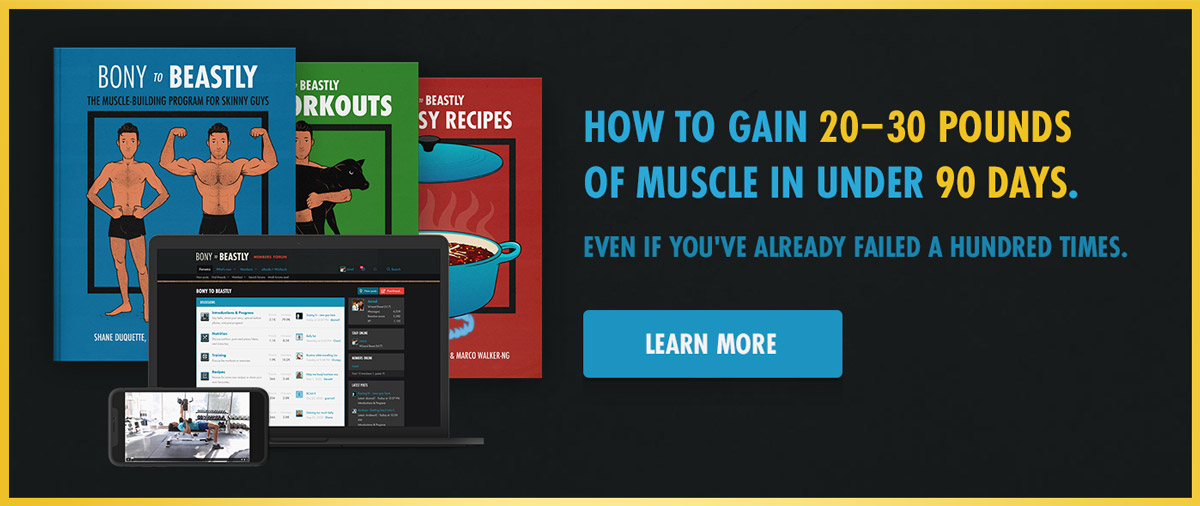
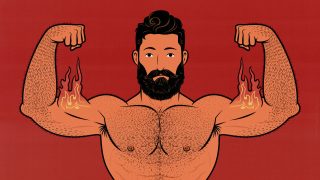


My biggest problem is that I don’t even know if I should be gaining weight or not. I’m a lean 44 year old dude with a little extra fat on the abs -nothing bad- who has recently fallen in love with calisthenics. I weigh 165 and wouldn’t mind some more definition, but don’t necessarily want to get big. No clue what to do.
Super cool art, Derrick!
If you want to get better at calisthenics, it can help to build muscle, especially in your upper body and core. If you’re already reasonably lean, it will be hard to build a significant amount of muscle without gaining weight. The extra weight you gain will make you heavier, but if it’s mostly muscle, it will wind up being a positive overall.
You don’t need to worry about getting too big. It won’t sneak up on you. If at any point you feel like you’ve gotten too muscular, you can just stop gaining weight. That rarely happens, though. Most natural lifters like how they look as they get stronger.
The fastest path to more muscle definition is by burning fat, but I’d do that later. Build some muscle and then settle back down to a lower body-fat percentage afterwards. That works much better than doing it the other way around.
This is all totally up to you, though 🙂
I’m greatly enjoying the Outlift program, and all the research based information. Could you suggest a vegetarian cookbook for lean bulking? Preferably without tofu or soy. I’m fine with dairy products and fish. I’m 56 and trying to reduce my mammal consumption. Thanks for all the great info!
Hey, Dan. That’s awesome! Glad you’re liking it.
I don’t know of any vegetarian recipe books that are specifically for lean bulking, but I recently bought At Home in the Whole Food Kitchen. It’s a vegetarian cookbook with a ton of great recipes in it. I especially like the red lentil stew recipe.
Outside of that recipe book, I’m a big fan of lentil stew in general. I also eat a ton of trail mix made from dried fruits, peanuts, soybeans, and pumpkin seeds. And I snack on apple slices dipped in peanut butter. Tons of great vegetarian bulking meals.